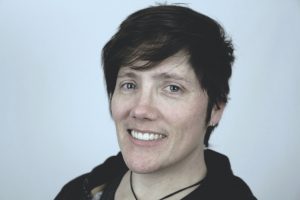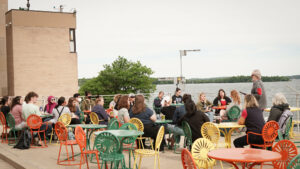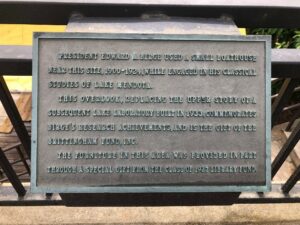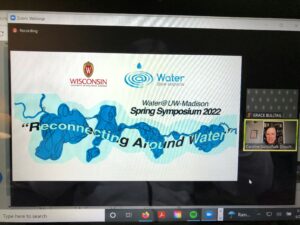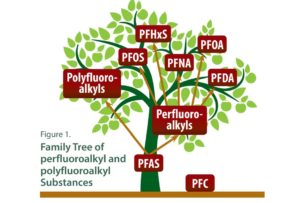Summer loving and the research is fine
When summer stretches before many college undergraduates, they make plans: Spend time outdoors. Connect with friends. Catch up on screen time.
For the 31 undergraduates participating in the 2023 Freshwater@UW Summer Research Scholars Program, those plans are the same, with slight alterations. The time outdoors is likely to be spent collecting field samples from a body of water. The friends are new ones—made from the pool of program participants who hail from California to Alabama from Virginia to Wisconsin, and points in between. The screen time isn’t about beating The Legend of Zelda: Tears of the Kingdom, but instead entering findings into a larger dataset to further aquatic science projects.

Sofia Mota Chichy will research magnesium oxide. Contributed photo.
“I looked at many summer REU (research experiences for undergraduates) opportunities,” Sofia Mota Chichy, chemistry major from the University of Michigan, said. “This one at Madison had the most in water chemistry and that’s what I am interested in. I’ve never worked in a chemistry lab before and it’s even better that it is an aquatic one.” Mota Chichy will be a part of University of Wisconsin-Madison’s Christine Remucal’s lab studying magnesium oxide.
A second young woman also expressed her attraction to this opportunity because of its emphasis on water. Plus, said Jessica Alcorn a student at Northwest Missouri State, “I want to go to graduate school here in Madison.” She’ll work under UW-Madison’s Matt Ginder-Vogel, who does both surface and groundwater research.
These springboards from research to a new path in life were celebrated by an enthusiastic Marissa Jablonski at a recent orientation session for the students. “Life will form you without you trying. You’re on your way. You’ve shown up. You’re leaning in.”
Jablonski is the executive director of the Freshwater Collaborative of Wisconsin, one of the funding entities for the summer program, about which, Sea Grant Director Jim Hurley said, “It’s been really positive to be able to expand our program because of support from the Freshwater Collaborative. Last year, we were a fledgling program of nine students.” Hurley secured a nearly $358,300 grant from the collaborative, resulting in this year’s larger cohort.
No matter the size of the group, though, Hurley said the goal remains unchanged, “The overall goal is to provide immersive student research experiences to enhance workforce development skills and allow undergraduates to consider the option of graduate studies in Wisconsin. Research experience as an undergraduate is an important component of a successful application for graduate school. In the job market, it also sets apart recent undergraduates who have addressed the changing needs of water-related fields.”
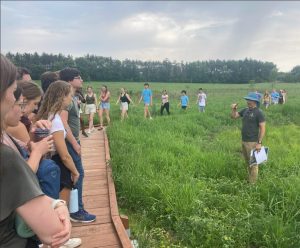
The 2023 cohort of summer research scholars undertook various orientation activities, including a tour of the UW-Madison Arboretum. Photo: Alison Mikulyuk
Expanding the number of participating students is one thing, another is the broadened involvement from professors, graduate students and others at organizations that are acting as mentors for the students. There are 48 in all, including people on University of Wisconsin System campuses in Eau Claire, Green Bay, La Crosse, Madison, Milwaukee and Oshkosh. Also providing formative experiences will be mentors from the U.S. Geological Survey, the Lake Superior National Estuarine Research Reserve, Wisconsin Shipwreck Coast National Marine Sanctuary and Wisconsin Maritime Museum.
In application materials, students this summer expressed interest in pursuing research into topics such as pollution, climate change, molecular structures of water, public health and more. The projects will deliver on that skill-building, spawning a new generation of water leaders. While the students will disperse across the state for these labs and field sites, they have a standing invitation to gather each Thursday virtually—and in-person if they are in Madison—for weekly professional development sessions on topics like science communication, navigating graduate school and proposal writing.
They will add these skills to their already prodigious ones in other areas that demonstrate well-rounded natures. At the orientation session, Alison Mikulyuk, summer research opportunity program coordinator, called out fun facts when she said among the group there was a proficient loon caller, a mushroom finder, dancers, an aspiring author, someone who graduated from high school as a 14-year-old, a boxer, world-medalist baton twirler, two twins, competitive swimmers, a multi-instrumentalist, many who play instruments and several who speak more than one language.
Mikulyuk urged the undergraduates to enjoy those skills of others, and also capitalize on the people who possess them, “Learn from each other. Care for each other…Take advantage of personal and professional connections.” She continued, “I hope you will have a life-changing experience that propels you forward in your next decades.”
The program will run until Aug. 5, culminating in a poster session where students will present their summer’s worth of findings.
In addition to the Freshwater Collaborative of Wisconsin and Sea Grant, the summer program has support from the University of Wisconsin Water Resources Institute, Water@UW Madison and the UW-Madison Graduate School.
The post Summer loving and the research is fine first appeared on Wisconsin Sea Grant.
News Releases | Wisconsin Sea Grant
News Releases | Wisconsin Sea Grant
https://www.seagrant.wisc.edu/news/summer-loving-and-the-research-is-fine/?utm_source=rss&utm_medium=rss&utm_campaign=summer-loving-and-the-research-is-fine

